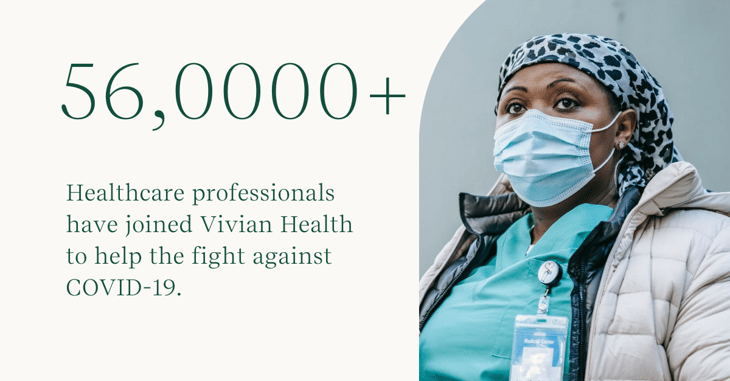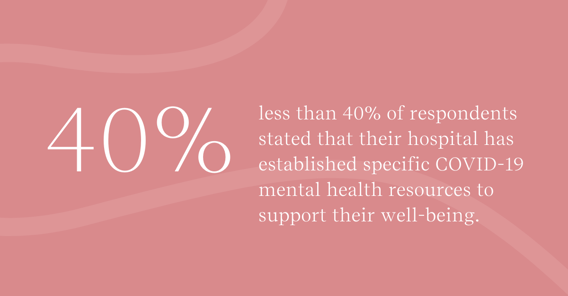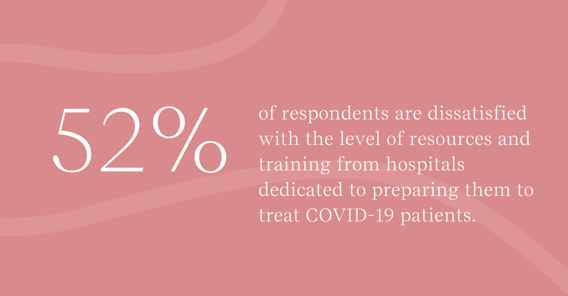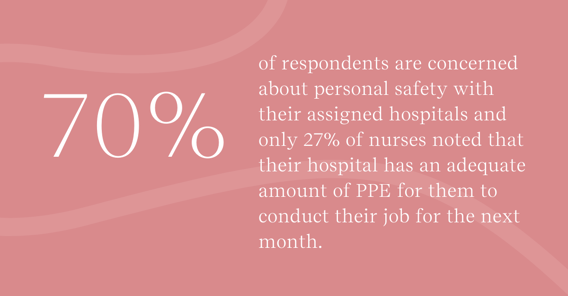From Parth Bhakta, CEO and Founder of Vivian Health, and Rachel Norton, ICU Travel Nurse from Vivian Health community
As we enter another week of COVID-19, we continue to read, hear and, in the experience of healthcare workers, witness, the devastating nationwide effects of the coronavirus pandemic.
We’ve seen thousands of nurses around the country continue to rise up and help areas hardest hit, but not without challenges to nursing and perils across health systems nationwide. Last week, the US experienced the deadliest day on record, as state governments start to navigate the obstacles of local reopening timelines.

A few key trends we’re tracking as the healthcare work environment is reaching new levels of volatility:
- Emergency Licensing opening up nurses to help around the country (subject to change if states revoke their emergency declarations).
- Job security is at risk, with stories of nurses losing employment due to declines in hospital revenue, while travel nurse contracts are being cancelled in some locations.
- Healthcare workers are stepping up to defend stay-at-home orders amidst protests.
In today’s climate, our nation’s healthcare workers are our most important asset, as they bring not only critical patient care, but an unmatched dedication to our safety and well-being. Amidst the crisis, we’ve seen bright spots as nurses band together in celebration of recovered patients, or even getting into character for patients entering the hospital.
Within the past few months, we’ve also heard increasing concerns from the travel nurse community as they confront conflicting information on conditions in hospitals, job security and personal safety. While there is a desire to take action and join the frontlines, travel nurses are uncertain about what they will face once they begin the assignment.
This week marks the start of National Nurses Week, and an opportunity for us to step back and take stock of nurses’ experience on the COVID-19 frontlines. As part of our mission to bring transparency to healthcare work, we wanted to bring to light what our community is experiencing on the frontlines.
We surveyed over 1,380 nurses and healthcare professionals from our community about hospital conditions, PPE, preparedness and the state of communications from national and local officials. We asked for details on stress levels, and how they feel about their personal safety following COVID-19 assignments.
We’ve put together a few key findings to highlight the nurse experience around the country.
Mental Health + Well-being
There was an overwhelming sentiment of stress for nurses, and an underwhelming report of hospitals providing them with resources to support their well-being.
- Nearly 80% of respondents feel more stressed in their day-to-day job since the COVID-19 crisis elevated.
- Nearly 60% of those respondents rely on mental health and wellness tools and practices to help manage the day-to-day.
- Yet, less than 40% of them stated that their hospital has established specific COVID-19 mental health resources to support their well-being
- Nearly 70% of ICU nurses are concerned about their safety or the safety of their immediate family once they return from their COVID-19 assignment.

Job Preparedness + Resources
Overall, respondents confirmed what we’ve been hearing in the news: there was an overall lack of investment in day-to-day preparedness for their roles to treat COVID-19 patients.

- 52% of respondents are dissatisfied with the level of resources and training from hospitals dedicated to preparing them to treat COVID-19 patients.
- 70% of respondents are concerned about personal safety with their assigned hospitals.
- 39% of respondents stated that their hospital did not have an adequate amount of PPE for them to conduct their job today

“Nurses are asking, do we have enough ventilators? Enough IV pumps? Enough medication to keep these patients comfortable and alive throughout their illness? There are no good answers. As healthcare professionals, we are preparing [every day] to have to adapt our practices to give care with limited resources and supplies.” - Rachel Norton, ICU Nurse
Communications + Response
Satisfaction with government response and communications was notably divided between state vs. national response. Nurses felt general satisfaction with the state’s response to COVID-19, but were dissatisfied with federal response, likely due to preparedness of individual governors.
- 65% nurses felt satisfied or very satisfied with the communications from their state government officials on the state of COVID-19.
- New York: Nearly 60% of New York respondents are satisfied with the communications from their state government officials.
- Texas: Almost 50% of Texas respondents are dissatisfied with the communications from their state government officials.
Supporting Our Community of Nurses and Healthcare Professionals
These findings are only the beginning of our commitment to raise awareness around the nurse experience, and to mobilizing national support for the healthcare community, today and in the future.
One of the most compelling findings from the survey was that more than 80% of nurse respondents are likely or very likely to continue working in healthcare after the COVID-19 crisis ends, showing the resilience and commitment behind their work as we navigate the next chapter of the pandemic.
"The findings illustrate the boundless compassion, bravery, and honor of nurses (and all healthcare workers!). Despite not knowing if we will continue to be protected or employed, we carry on and continue to give the best possible care in the environment in which we are practicing. Outside of healthcare, what other profession can claim that? We don't do it for the glory or to be heroes. We do it because we care about people and the future of humanity.” - Rachel Norton, ICU Nurse
We’ve Put Together Some Handy Resources for Nurses
Ready to help with COVID-19 efforts? We’re keeping an updated list of assignments at vivian.com/covid19. Apply now and we’ll immediately put you in touch with a recruiter that can give you more information.
Need help navigating COVID-19 as a nurse?? We've put together a resource center for all you need to know, including up-to-date licensing information, and even great apps to help with your mental health. COVID-19 Resource Center
Not ready yet? Make sure to keep your Vivian Universal Profile up-to-date. This will speed along the application process at over 50 agencies once you are ready to join the fight.
Know of any others who might want to help? Please share our COVID-19 Facebook post with any healthcare professional friends who might be interested.